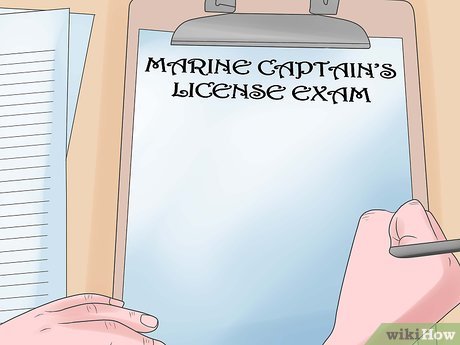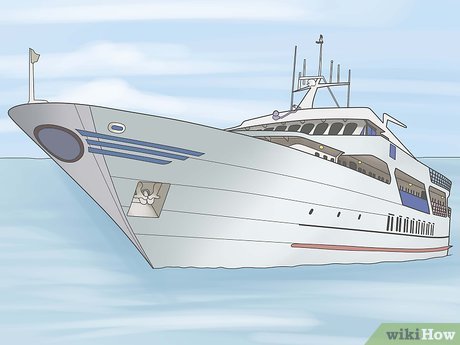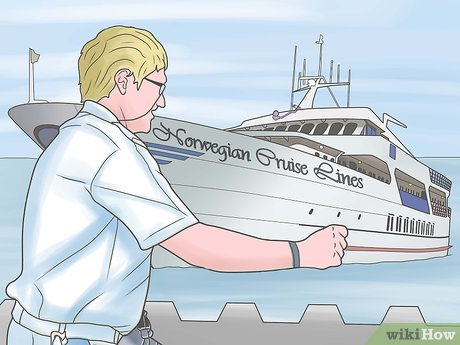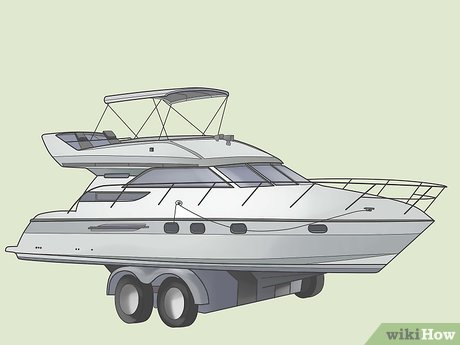How to Start a Cruise Line
Part 1 of 3:
Planning Your Cruise Line
-
 Gain industry experience. You don't need to have worked in the boating industry to start a cruise line, but doing well will require an intimate knowledge of this industry and the inner working of cruise ships. You may be able to gain a good amount of experience by being a cruise planner (like a travel agent for cruises) or a high-ranking employee aboard another cruise ship.
Gain industry experience. You don't need to have worked in the boating industry to start a cruise line, but doing well will require an intimate knowledge of this industry and the inner working of cruise ships. You may be able to gain a good amount of experience by being a cruise planner (like a travel agent for cruises) or a high-ranking employee aboard another cruise ship.- For example, working as a captain, entertainment coordinator, guest services manager, or another important position aboard another ship would be good preparation for starting your own line.
-
 Decide whether you want to develop your cruise line from scratch on your own or with a syndicate (a group of partners). Each approach has its advantages and disadvantages, and it's a good idea to research each option thoroughly to ensure that the decision you reach is the right one given your expertise, financial flexibility, and previous experience.
Decide whether you want to develop your cruise line from scratch on your own or with a syndicate (a group of partners). Each approach has its advantages and disadvantages, and it's a good idea to research each option thoroughly to ensure that the decision you reach is the right one given your expertise, financial flexibility, and previous experience.- Developing a cruise line on your own will require you to build your service offerings, buy or charter ships, create marketing strategies, and design operational structure on your own, which will be expensive and require trial and error.
- Working with a syndicate can give you the benefit of having partners that share in your business and also share the risk and responsibility.
-
 Study the market and your competition. Learn about the industry and your competitors so that you can outline an unfulfilled niche for your cruise line to fill. This is the only way you can be profitable, as the cruise industry is highly competitive. What will be different or unique about your cruise line that will attract paying customers? Think about offering very luxurious travel, unique experiences or entertainment, or going to unusual locations as a way to differentiate yourself.
Study the market and your competition. Learn about the industry and your competitors so that you can outline an unfulfilled niche for your cruise line to fill. This is the only way you can be profitable, as the cruise industry is highly competitive. What will be different or unique about your cruise line that will attract paying customers? Think about offering very luxurious travel, unique experiences or entertainment, or going to unusual locations as a way to differentiate yourself.- Avoid taking on the large players, like Carnival and Royal Caribbean, directly, as these are powerful and established companies.
- However, there are a number of smaller companies that serve under 10,000 passenger per year. You could compete against these companies more easily than you could against the larger ones.[1]
-
 Consider your routes and destinations. Think about what cruise routes you plan to use and what permissions you'll need to obtain to navigate them, or what competition you'll be up against on the same routes. You should also think about where you will be sailing from and what that means for your target customers. Market penetration for cruise lines is relatively low outside the United States, which could offer an opportunity for easy growth in an untapped market, like Asia or the Middle East.
Consider your routes and destinations. Think about what cruise routes you plan to use and what permissions you'll need to obtain to navigate them, or what competition you'll be up against on the same routes. You should also think about where you will be sailing from and what that means for your target customers. Market penetration for cruise lines is relatively low outside the United States, which could offer an opportunity for easy growth in an untapped market, like Asia or the Middle East.- It would be more cost-effective to start a boat-charter service or mini-cruise ship line. This would also somewhat simplify your navigation restrictions and enhance your ability to access more remote locations.
-
 Estimate startup costs. When starting a cruise line, your primary expense will be purchasing or building your ships. The cost will depend on what size cruise line you are considering. This can vary from a small fleet of one or two small cruise boats that can take just a small group right up to a full-size liner. For most people, a sensible beginning is a small cruise boat with room for a small group or family. This will allow you to build up your business over time and prove to yourself and others that it can work.
Estimate startup costs. When starting a cruise line, your primary expense will be purchasing or building your ships. The cost will depend on what size cruise line you are considering. This can vary from a small fleet of one or two small cruise boats that can take just a small group right up to a full-size liner. For most people, a sensible beginning is a small cruise boat with room for a small group or family. This will allow you to build up your business over time and prove to yourself and others that it can work.- The cost of this type of small boat depends on its size and features, but even a small cruise ship with 100 berths will cost about $50 million.
- A full-sized cruise ship, like those used by Royal Caribbean and Carnival, will cost you at least $150 million (for the smallest ship class).
- The largest ships currently on the water cost a whopping $1.2 billion.
- Your cost will also depend on your specific ship needs. Are you fine with customizing an existing one, or do you need to have a boat or ship built from scratch? Obviously customizing or buying a ready-made cruise boat will cost less than commissioning one from scratch.[2]
- You will also need operating capital to buy fuel, pay dock fees, pay employees, stock the ship with supplies, and for other ongoing expenses.
-
 Consider chartering your cruise ships instead of buying them. Chartering an existing cruise ship is a cheaper option (although still pricey). Chartering allows you to "borrow" or lease a ship for your own cruise to use as you see fit. For example, some organizations have chartered cruise ships for special interest events or poker tournaments. Chartering is still expensive, though. For example, a three-day charter for one of Royal Caribbean's ships can cost over $900,000. Longer trips may cost up to $6 million.[3]
Consider chartering your cruise ships instead of buying them. Chartering an existing cruise ship is a cheaper option (although still pricey). Chartering allows you to "borrow" or lease a ship for your own cruise to use as you see fit. For example, some organizations have chartered cruise ships for special interest events or poker tournaments. Chartering is still expensive, though. For example, a three-day charter for one of Royal Caribbean's ships can cost over $900,000. Longer trips may cost up to $6 million.[3]- To cover these costs, you will have to fill the boat with customers and find a way to earn back your charter fee, plus a profit for yourself, over the course of the trip.
-
 Develop a business plan. Before you even go to the bank or look for other sources of financing, it's vital to have a business plan drawn up and thoroughly ready. It's your source of convincing others that this project is a go-ahead. As part of developing your business plan, address all previous steps in this part, including your own experience, your competition, the state of the market, your funding needs, and your planned routes.[4] You also need to spell out:
Develop a business plan. Before you even go to the bank or look for other sources of financing, it's vital to have a business plan drawn up and thoroughly ready. It's your source of convincing others that this project is a go-ahead. As part of developing your business plan, address all previous steps in this part, including your own experience, your competition, the state of the market, your funding needs, and your planned routes.[4] You also need to spell out:- Your cruise line's name. This should differentiate you from your competition in the same way that your offerings do. Make sure that your name reflects the type of cruise line you are starting.
- The activities you plan to provide on your cruise. For example, whale-sighting cruising, on-board activities, visiting cities or islands, etc.
- Your pricing structure. Remember that cruise lines profit primarily from on-board purchases like food and alcohol, rather than from the ticket sales. For a starting point, the average price of a cruise ticket in 2015 was $1,350, while customers spent an average of $429 on on-board purchases. However, much of the ticket price is eaten up by overhead expenses, like crew and fuel costs.[5]
- Earnings and growth projections.
Part 2 of 3:
Starting Your Cruise Line
-
 Decide country of origin (flag state) where you'll register your vessels. Find out what licenses you'll need. Registration restrictions and paperwork tend to be less complicated in developing countries, so consider registering there rather than in the United States.
Decide country of origin (flag state) where you'll register your vessels. Find out what licenses you'll need. Registration restrictions and paperwork tend to be less complicated in developing countries, so consider registering there rather than in the United States. -
 Raise the necessary funding. Decide what sort of financing will be best for your venture. Sources of financing include the bank, other major lenders (including cooperatives and credit unions), venture capitalists, angel investors, partnerships, and crowdfunding.
Raise the necessary funding. Decide what sort of financing will be best for your venture. Sources of financing include the bank, other major lenders (including cooperatives and credit unions), venture capitalists, angel investors, partnerships, and crowdfunding.- The easiest way to finance a business is to do it yourself using your savings. However, coming up with this type of money this way is not feasible for most people.
- Taking out a small business loan can be an effective solution for funding your business, assuming you qualify for one. To do so, you will need experience, a sound business plan, and good personal credit. The Small Business Administration, SBA, offers guarantees on small business loans that can help you get the loan you need.
- The limit for an SBA-guaranteed loan is $5 million, through an International Trade and Export Working Capital loan. Most of the other SBA programs offer less and are subject to strict underwriting. In addition, you must find a lender who is familiar enough with the industry and willing to make loans, as the SBA program is a guarantee, not a source of capital itself.
- Angel investors are more difficult to obtain but can be a great source for both capital and advice, as the angel is usually an experience businessperson. Angels offer start up funds in exchange for equity (partial ownership) in your company.[6]
-
 Obtain your ships. When you have financing in place, you'll need to purchase or charter your ships. Search online at sites like YachtWorld or Ships4Ever.com to find listings then contact the shipbroker in charge of a ship you want to negotiate a price and go through with the sale. If you are buying a smaller boat, or several, there are many other sites offering listings for smaller yachts and cruisers.
Obtain your ships. When you have financing in place, you'll need to purchase or charter your ships. Search online at sites like YachtWorld or Ships4Ever.com to find listings then contact the shipbroker in charge of a ship you want to negotiate a price and go through with the sale. If you are buying a smaller boat, or several, there are many other sites offering listings for smaller yachts and cruisers. -
 Equip and repair the ships as required. If you find a good deal on a used ship, that probably means that you will have to make repairs to make the ship ready for passengers. Hire an engineer to make sure that the boat is structurally sound and seaworthy, and that the engines are functioning properly. In addition, you may want to make modifications to your ship to add more amenities, cabin features, shops, or communal spaces. Buy appliances and furniture for cabins as needed.
Equip and repair the ships as required. If you find a good deal on a used ship, that probably means that you will have to make repairs to make the ship ready for passengers. Hire an engineer to make sure that the boat is structurally sound and seaworthy, and that the engines are functioning properly. In addition, you may want to make modifications to your ship to add more amenities, cabin features, shops, or communal spaces. Buy appliances and furniture for cabins as needed. -
 Hire employees. Depending on the size of your cruise ship and overall operation, you will need a variety of crew and employees to make your cruise line run smoothly. For example, you will certainly need crewmen for the ship to run the engines and repair anything that breaks. You will also probably need administrative assistants to handle bookings and billing. Then, you will need to hire food service personnel and maids to handle the cooking and cleaning. Finally, you will need employees to provide entertainment, such as musicians or tour guides for outings.
Hire employees. Depending on the size of your cruise ship and overall operation, you will need a variety of crew and employees to make your cruise line run smoothly. For example, you will certainly need crewmen for the ship to run the engines and repair anything that breaks. You will also probably need administrative assistants to handle bookings and billing. Then, you will need to hire food service personnel and maids to handle the cooking and cleaning. Finally, you will need employees to provide entertainment, such as musicians or tour guides for outings.- If you run a very small operation, you may be able to fill many of these roles yourself.
Part 3 of 3:
Preparing to Set Sail
-
 Buy Insurance coverage. One of the primary types of insurance you will need is general liability insurance. This will cover your legal expenses, court fees, and settlements in the event that you are sued by a customer who was injured on one of your cruises. This can help you avoid being financially ruined by one bad experience.[7] You may also need insurance to cover potential losses of property in case of a fire or shipwreck. Contact major insurers to inquire about this type of coverage.
Buy Insurance coverage. One of the primary types of insurance you will need is general liability insurance. This will cover your legal expenses, court fees, and settlements in the event that you are sued by a customer who was injured on one of your cruises. This can help you avoid being financially ruined by one bad experience.[7] You may also need insurance to cover potential losses of property in case of a fire or shipwreck. Contact major insurers to inquire about this type of coverage.- Customers can sue for any number of reasons, so it's best to get the highest insurance coverage amount that you can afford. Passengers can even sue over rough seas.
-
 Obtain the required licenses and permits. You will need licenses to operate as a business and as a cruise line. The specific licenses will depend on where you are registered and also where you go stop along your routes. You will need to gain clearance from a part authority or local government anywhere you plan to stop. Because of the complex nature of these permits and dealing with local authorities, it may be wise to hire a consultant who can help you with this.
Obtain the required licenses and permits. You will need licenses to operate as a business and as a cruise line. The specific licenses will depend on where you are registered and also where you go stop along your routes. You will need to gain clearance from a part authority or local government anywhere you plan to stop. Because of the complex nature of these permits and dealing with local authorities, it may be wise to hire a consultant who can help you with this.- You will also need to obtain liquor licenses for the relevant regions if you are not cruising in international waters.
- In all case, contact the relevant authority (ports, the coast guard, local governments, etc.) to inquire about specific permit and license requirements.
- You must adhere to the CDC's twice-annual required health inspections, due to the outbreaks of various intestinal diseases on cruise ships. This is also a form of liability.
-
 Advertise your first cruise. Now that you're ready to sail, you'll have to attract customers to fill your first voyage. Set a date and begin creating a marketing plan to reach the right customers. Be sure to consider first exactly who you want to attract. Are you looking for elderly retirees or young people? Do you want families, couples, or single people onboard? Your answers to these questions depend on the nature of the cruise you are offering and will inform your advertising strategies and media choices.
Advertise your first cruise. Now that you're ready to sail, you'll have to attract customers to fill your first voyage. Set a date and begin creating a marketing plan to reach the right customers. Be sure to consider first exactly who you want to attract. Are you looking for elderly retirees or young people? Do you want families, couples, or single people onboard? Your answers to these questions depend on the nature of the cruise you are offering and will inform your advertising strategies and media choices.- For example, many cruise lines are now seeking to attract millennials by offering cruises focused more on adventure and destinations than on on gambling and shopping.[8]
-
 Double check your ship, crew, and operations. Before you depart, run a check of all your ship's systems, crew members, and services. Make sure everything is running smoothly and efficiently. Your first voyage will need to go through without problems if you hope to keep running your cruise line for very long, so make sure to be absolutely ready before departing.
Double check your ship, crew, and operations. Before you depart, run a check of all your ship's systems, crew members, and services. Make sure everything is running smoothly and efficiently. Your first voyage will need to go through without problems if you hope to keep running your cruise line for very long, so make sure to be absolutely ready before departing.
Share by
David Pac
Update 24 March 2020















